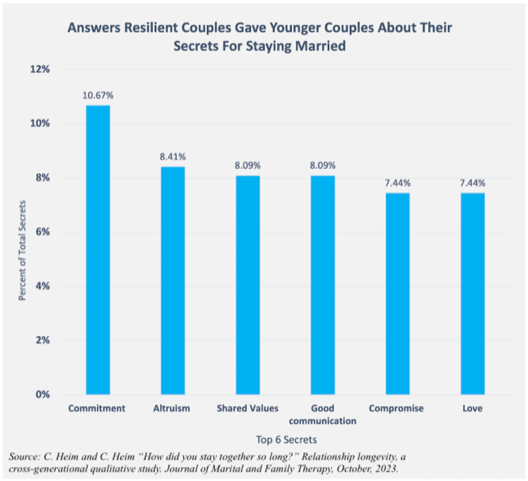
When younger married couples asked those married 40-plus years about the “secret to staying together,” the number one key ingredient cited by veteran marrieds was “commitment.”
So report Australia-based authors Christian Heim and Caroline Heim in “Resilient Relationships,” a book based on the “largest cross-sectional, global study of long-term relationships to date.”
Both the younger and older married couples who participated in the study revealed questions and answers that amount to a piercing “wake-up call” to all of us, the authors wrote Wednesday at the Institute for Family Studies:
[W]e asked younger couples from 14 different countries who had been together 3 to 15 years, “If you could pose a question to couples married over 40 years, what would it be?” The questions they posed should be a sharp wake-up call to us all. Even in our current hyper-individual Zeitgeist, these younger people want their relationships to stay together. We also asked the resilient couples a similar question on what advice they would offer, and the answers they gave are an even greater wake-up call.
The authors found that the top five questions younger couples wanted to ask “resilient” couples were:
- What is your secret to staying together? (63.72%)
- Is the [sexual] spark still there? (17.64%)
- How do you stop arguing? (10.78%)
- How do you keep your marriage fun and not boring? (10.78%)
- How do you keep connected? (7.84%)

The authors conducted “90 in-depth interviews with 180 coupled individuals married 40+ years,” who ultimately provided answers to the younger couples’ questions. The resilient couples replied with the following answers about the “secrets” of their long-lasting relationships:
- Commitment (10.67%)
- Altruism (8.41%)
- Shared Values (8.09%)
- Good communication (8.09%)
- Compromise (7.44%)
- Love (7.44%)

“[C]ommitment was the number one glue-secret,” Heim and Heim explained as they elaborated on several of the top responses:
Couples told us that commitment was “essential,” “the glue,” “vital,” and “the ultimate important thing.” We were told that commitment encompassed marriage vows, “sticking together” in times of hardship, and actively showing commitment to the relationship “on a daily basis.”
The authors referred to “altruism” as a “novel finding,” writing that the response “may be a reflection of what older couples feel is needed in the face of hyper-individual pressures, like the relentless pursuit of self-expression, solipsism, and hedonist pleasures.”
As one husband of nearly 50 years said: “Be unselfish, think of that other person’s needs more than your needs. It’s hard … give to the other person more than yourself.”
Heim and Heim explained the third most popular “secret” for staying married – “shared values” – could take different forms depending on the age of the couple when they first met and then married.
“Two people naturally bring their own individual values into a relationship and learn to negotiate shared values from there,” they wrote:
Some couples, however, talked about how they forged their values together from early on: “When we met, I was 17, he was 20. Our value system hadn’t really developed. Through living together and talking together, we basically developed the same values (wife, married 60 years).”
The researchers also noted several topics that did not make the list: “having great sex, fun, a career focus, or a search for celebrity.”
“[P]erhaps they are the icing to some of the core glue-secrets,” they surmised. “They may or may not have been captured under the rubrics of common interests and shared values.”
Heim and Heim observed the paradox that, despite the considerable evidence cited in their book that shows marriage benefits not only physical and emotional health but also a sense of general happiness in life, “over the past five decades, we have seen unprecedented rates of marriage decrease and divorce increase.”
However, after having studied “over 1200 people married 40+ years,” the authors say their study finds: “The most selfish thing two people can do for their long-term selves is to nurture their long-term relationship.”
With effort from two people, a couple can actually have it all. Perhaps that’s the secret. As Susan and Bruce (married 49 years) remarked, “We think of ourselves as a jigsaw puzzle. If one of us is not there, the puzzle is not complete.” With the help of insights like this, perhaps the puzzle of reconciling hyper-individualism and relationship resilience can be solved.

